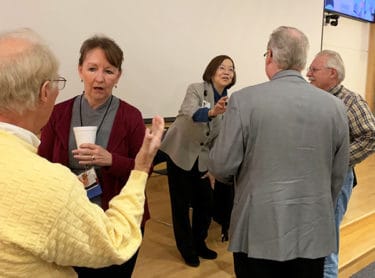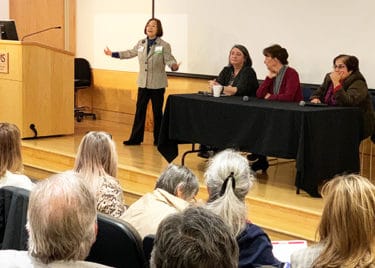Dementia Update Presents Latest Research
| The full power of UAMS experts in dementia was on display at the Dementia Update hosted by the UAMS Reynolds Institute on Aging on Nov. 21-22.
The conference drew more than 130 health care professionals and caregivers. The theme was “Preserving function and information about quality of life” among patients with neurocognitive disorders. The presentations provided the latest research on the diagnosis, treatment and prevention of dementia, along with caregiver support for patients with memory loss.

During a break between sessions, Denise Compton, second from left, and Jeanne Wei, M.D., Ph.D., executive director of the Reynolds Institute, third from left, answer questions from attendees at the Dementia Update.
“The onset of delirium is typically sudden, as in ‘Yesterday, mama was fine, but today, she’s acting very confused.’ With dementia the decline is gradual, usually over months and years,” said Denise Compton, Ph.D., the senior geriatrics neuropsychologist in the UAMS Donald W. Reynolds Institute on Aging.
Another expert speaker was Lou Ann Eads, M.D., program director of the UAMS Geriatric Psychiatry Fellowship Program. She provided some practical guidance on how to address dementia in patients.
“Delirium is not really a disease or a disorder. It is a syndrome and a sign that something is wrong with the brain, and we need to figure it out,” Eads said. “The sooner we figure it out, the better it is for the patient.”
Other expert speakers discussed dementia-related topics including imaging the brain in dementia, assessment tools, depression, cardiovascular factors affecting cognition and medications affecting cognition, as well as sleep disorders and cognition. Early planning, healthy eating and quality of life also were discussed.
Sue Griffin, Ph.D., discussed the latest research directions. Griffin is the Alexa and William T. Dillard professor in geriatric research and vice chairman for research at the UAMS Donald W. Reynolds Institute on Aging
Gohar Azhar, M.D., presented on “Pitfalls to avoid when diagnosing Dementia.” She also discussed case studies of common medical conditions, including one patient with blue fingers and blue toes caused by too high a dose of an antidepressant medication, which improved after medication adjustment. Azhar is a professor in the Reynolds Department of Geriatrics in the College of Medicine and co-director of the Cardiovascular Aging Program at the Reynolds Institute.

Jeanne Wei, standing on stage, moderates a panel discussion with, left to right, Lou Ann Eads, Denise Compton and Gohar Azhar.
Angela Norman, D.N.P., presented “A new approach to behaviors in those living with dementia,” and encouraged providers and caregivers to try to understand and find reasons for the various behaviors, rather than assume that they are “behavioral issues” that need to be managed. Norman is an associate director of the UAMS Centers on Aging.
Regina Gibson, Ph.D., assistant professor/nurse educator in research at the Institute on Aging, discussed how the Ageless Grace exercise program can provide physical stimulation to patients with delirium or cognitive impairment while minimizing fall risk. Ageless Grace has 21 simple exercise tools that are designed to be done while seated but can be on a bed, standing near or behind a chair, or down on the floor.
“Keeping your brain engaged and rewiring itself is key to not only your long-term cognitive functioning but also your overall well-being,” Gibson said.
Another source of stimulation is art therapy.
“The creative part of our brain doesn’t appear to be as affected by memory loss as other parts of our brain, like those where language skills reside. We believe people with cognitive decline can engage in creative activities that can maintain their functions longer,” said Brandi Schneider, a licensed master social worker at the UAMS Schmieding Center for Senior Health and Education in Springdale.
“Art as well as music can trigger emotional memories,” Schneider said. “Therapeutically, it can be very effective in the early stages of cognitive impairment, and with some adjustment, can help in the middle and even late stages of dementia.
“It’s a way to give voice back to people who no longer can express themselves verbally,” she said. “Their emotions can come out on the page. It’s an outlet and a potential source of joy for them.”
Several vendors and programs had information booths at the conference.
